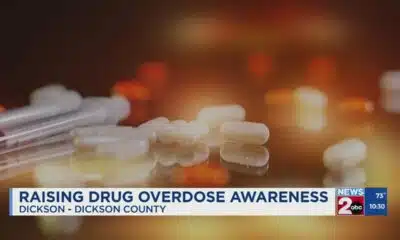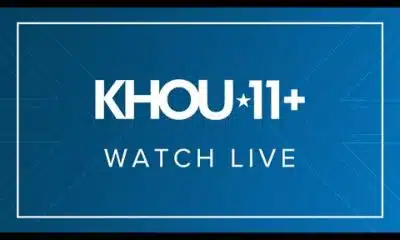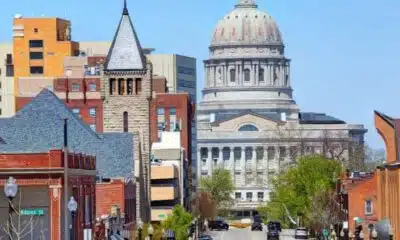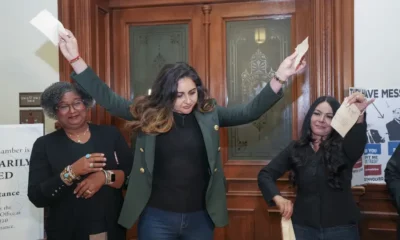News from the South - Tennessee News Feed
New national school voucher program included in ‘big, beautiful’ law, with no cap on cost
by Shauneen Miranda, Tennessee Lookout
July 12, 2025
WASHINGTON — A national private school voucher program is now law, though the school choice initiative comes with a huge caveat. States also choose — whether or not to participate.
It’s a setback for advocates who hoped to see the program — baked into the mega tax and spending cut bill President Donald Trump signed into law on July Fourth — mandated in all 50 states.
The permanent program, which starts in 2027, saw several versions between the House and Senate before getting to Trump’s desk as part of congressional Republicans’ massive reconciliation package.
Robert Enlow, president and CEO of EdChoice, touted aspects of the program, but said his organization would have preferred to see a 50-state program, rather than allowing states to opt in or decline.
“I think I’m really worried about that because this is seen as a sort of more partisan issue and as a result, what would make a governor in a blue state say, ‘Let me bring in school choice’?” said Enlow, whose nonprofit focuses on advancing school choice options.
Still, Enlow described the program as “just another step along the way of giving parents more choices.”
Who will join?
It remains to be seen which states will participate, including those with their own voucher programs already underway.
Jon Valant, a senior fellow at the nonpartisan Brookings Institution, said he’s “not clear on how states will shake out on the question of whether or not to participate.”
“I’m sure the vast majority of, really, all red states will participate in this thing, but I don’t know what’s going to happen in blue and purple states,” said Valant, who also serves as director of the think tank’s Brown Center on Education Policy.
Despite that unknown, Valant said that states “do have some incentive to participate because if they don’t, then they’re potentially losing access to some funds that they wouldn’t otherwise get.”
How the program works
The program allocates up to $1,700 in federal tax credits for individuals who donate to organizations that provide private and religious school scholarships.
There is also no cap to the cost of the program, unlike earlier versions seen in both chambers of Congress.
The scholarship funds would be available to families whose household incomes do not exceed 300 percent of their area’s median gross income.
More than 138 million people could be eligible to make use of the tax credit in 2027, according to an analysis from the Institute on Taxation and Economic Policy.
However, Carl Davis, research director of the left-leaning think tank, notes in the analysis that “most of those people will not contribute” given the necessary paperwork and vouchers’ unpopularity with the public.
A state’s program participation will be decided by its governor or “by such other individual, agency, or entity as is designated under State law to make such elections on behalf of the State with respect to Federal tax benefits,” according to the final bill text.
The GOP’s school choice push
The umbrella term “school choice” centers on alternative programs to one’s assigned public school.
The effort has sparked controversy, as opponents say these programs drain critical funds and resources from school districts, while school choice advocates describe the initiatives as necessary for parents dissatisfied with their local public schools.
Trump and congressional Republicans have made school choice a major part of their education agenda.
The program also reflects a sweeping bill that GOP Reps. Adrian Smith of Nebraska and Burgess Owens of Utah and Sen. Bill Cassidy of Louisiana reintroduced in their respective chambers earlier this year.
‘Very little quality control’
Valant, of the Brookings Institution, expressed several concerns about the program, saying “there’s very little quality control, transparency or accountability for outcomes in this program, and it’s potentially a major use of public taxpayer funds.”
He said he doesn’t see anything in the program’s text that “protects against widespread waste, fraud and abuse and from programs and schools that aren’t providing much value at all to students from continuing to get a large amount of funding.”
The program also came as Trump and his administration continue to dramatically redefine the federal role in education.
Trump’s fiscal 2026 budget request calls for $12 billion in spending cuts to the Education Department. A summary from the department said this cut “reflects an agency that is responsibly winding down.”
Billions on hold
The administration has also taken heat for its recent decision to put on hold $6.8 billion in federal funds for K-12 schools.
Sasha Pudelski, director of advocacy at AASA, The School Superintendents Association, said that a time when the administration is withholding billions of dollars in these funds for public schools, “the idea that we’re going to spend an unlimited amount of tax dollars to support private and religious schools is unthinkable, unimaginable — it’s horrific.”
“This is yet another handout to wealthy Americans who can already afford to send their children to private religious schools and at a cost that comes from tax dollars being deferred away from public education that serve the poorest and neediest students in America,” added Pudelski, whose organization helps to ensure every child has access to a high quality public education.
Tennessee Lookout is part of States Newsroom, a nonprofit news network supported by grants and a coalition of donors as a 501c(3) public charity. Tennessee Lookout maintains editorial independence. Contact Editor Holly McCall for questions: info@tennesseelookout.com.
The post New national school voucher program included in ‘big, beautiful’ law, with no cap on cost appeared first on tennesseelookout.com
Note: The following A.I. based commentary is not part of the original article, reproduced above, but is offered in the hopes that it will promote greater media literacy and critical thinking, by making any potential bias more visible to the reader –Staff Editor.
Political Bias Rating: Center-Right
This content primarily presents the national school voucher program, a policy generally supported by conservative and Republican leaders, positively but with acknowledgment of criticisms from left-leaning sources. It highlights the GOP’s emphasis on school choice and includes comments from advocates aligned with conservative education reform while also giving voice to critiques about public school funding and potential risks raised by left-leaning think tanks and education associations. The coverage strives for balance but leans center-right by framing the initiative as a step forward in parental choice, aligning with mainstream conservative education priorities.
News from the South - Tennessee News Feed
Multiple injuries reported among first responders following large-scale structure fire in Decatur County
SUMMARY: A large fire broke out Friday afternoon at GSM Outdoors in Parsons, Decatur County, Tennessee, prompting a multi-agency response involving local and neighboring county fire departments, EMS, police, and emergency management teams. Residents nearby were evacuated as the fire spread rapidly, requiring extensive medical treatment for several injured firefighters and public safety officers. Agencies including Air Evac, Tennessee Emergency Management, and local utilities assisted. While the fire was largely contained, the site remains active with lingering smoke and smoldering. No hazardous chemicals were found, and the cause is under investigation by the Tennessee Bureau of Investigation. Emergency crews continue monitoring the scene.
The post Multiple injuries reported among first responders following large-scale structure fire in Decatur County appeared first on www.wkrn.com
News from the South - Tennessee News Feed
Dickson recovery nurse shares message of hope ahead of International Overdose Awareness Day
SUMMARY: Ahead of International Overdose Awareness Day, Ashley Miller, a recovery nurse, shares a message of hope. Having lost a close figure to overdose in 2019, Miller also witnessed a friend’s successful recovery, inspiring her work. She emphasizes the importance of celebrating survival stories alongside honoring lives lost, highlighting that addiction can be treated. Allison Avalon from Drug-Free Dixon Coalition stresses compassion and kindness in supporting individuals struggling with addiction and fostering stronger communities. Both Miller and Avalon encourage those affected by addiction, reminding them it’s never too late to seek help, regardless of past relapses or treatment attempts.
International Overdose Awareness Day is a reminder of the lives lost to addiction, along with the power of compassion and recovery, as seen through the story of a Dickson nurse who has turned personal loss into a mission to help others.
News from the South - Tennessee News Feed
Tennessee’s first charter school for at-risk youth approved following denial from MNPS
SUMMARY: Tennessee’s first opportunity charter school, The Rock Academy, designed for at-risk students, was approved by the Tennessee Public Charter School Commission, overturning Metro Nashville Public Schools’ prior denials. Opportunity charter schools must serve populations with at least 75% at-risk students, including those held back, chronically absent, or in foster care. The Rock Academy’s later start time and mastery-based learning model faced criticism from MNPS. The school, authorized by legislation passed last year amid Democratic opposition, aims to fill gaps in current education options. It will open in 2026-27 with 88 ninth graders, offering a new approach to support underserved students.
Read the full article
The post Tennessee's first charter school for at-risk youth approved following denial from MNPS appeared first on www.wkrn.com
-
News from the South - Texas News Feed5 days ago
Racism Wrapped in Rural Warmth
-
News from the South - Missouri News Feed6 days ago
Donors to private school voucher program removed from Missouri transparency site
-
News from the South - Alabama News Feed6 days ago
Child in north Alabama has measles, says Alabama Department of Public Health
-
News from the South - Texas News Feed6 days ago
Texas Democrats’ walkout prompts GOP retribution
-
Our Mississippi Home6 days ago
After the Winds: Kindness in Katrina’s Wake
-
News from the South - Tennessee News Feed6 days ago
A marsh bird found in Tennessee wetlands is endangered. FWS is drafting a plan.
-
News from the South - Alabama News Feed7 days ago
Wilsonville residents seek preemptive strike against massive data center project
-
News from the South - Missouri News Feed6 days ago
New Missouri law means state is no longer allowed to seize assets of prison inmates











































